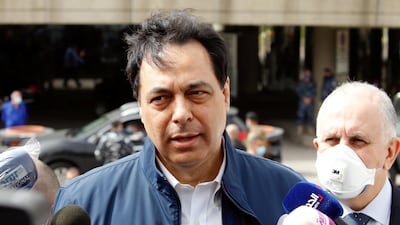Lebanese Prime Minister Hassan Diab struck a defiant tone on Saturday, saying that he would “not resign” despite hitting a brick wall in negotiations for a bailout with the IMF as the country sinks deeper into its worst economic crisis.
“I will not resign,” Mr Diab, who has served as prime minister since January, told journalists after meeting Maronite Patriarch Bechara Rai.
Lebanese politicians, including two ministers affiliated with President Michel Aoun’s Free Patriotic Movement, have publicly discussed the possibility of the government’s resignation.
Government members questioned the “benefit of continuing in light of the lack of achievements”, Energy Minister Raymond Ghajar told a local radio station on July 4.
Others pushed for the return of former prime minister Saad Hariri, who stepped down on October 29 under the pressure of nationwide anti-government protests triggered by the economic crisis.
Mr Diab said that if he resigned, “an alternative would not be found easily. We will be a caretaker government for perhaps a year or two, and this is a crime against the country and against the Lebanese.”
Negotiations to form a government or appoint a president in Lebanon can take months or years as political parties must reach a consensus to maintain the country’s delicate sectarian balance.
Mr Diab formally requested IMF assistance in early May, after announcing that the country would default on its debt for the first time, but the negotiations on a bailout have not moved forward. The IMF has blamed the deadlock on the lack of a unified Lebanese position on the losses of the country’s banking sector.
Starting last summer, a cash crisis has pushed Lebanon, one of the world's most indebted countries, into the worst economic and financial crisis in its modern history. Half of the Lebanese population is now living in poverty and the value of the local currency has dropped by roughly 80 per cent.
Mr Diab’s statement came after increasing criticism from Mr Rai of the Shiite Muslim party Hezbollah, one of the government’s most influential backers and an ally of President Aoun.
In an interview with Vatican News on Thursday, the Maronite patriarch said Hezbollah “sidelines the state, and declares war and peace wherever it chooses. It helped precipitate war in Syria, Iraq and Yemen.”
Mr Rai said the United States, European Union and Arab Gulf countries would not help Lebanon because they did not want their financial aid to be used by Iran-backed Hezbollah.
“That’s why we’re paying the price,” he told Vatican News.
Earlier in the week, Mr Rai met Iranian Ambassador to Lebanon Mohammad-Jalal Firouznia, who said that his country “does not intervene in internal Lebanese affairs”.
On Saturday, the patriarch reiterated calls for Lebanon to remain “neutral”, in what has been widely interpreted by Lebanese media as a criticism of Hezbollah's military interventions in the region.
His calls have been well received by Mr Hariri and the Lebanese Forces, a Christian party, but was rejected by Shiite clerics in their sermons on Friday, local media reported.
Mr Diab dismissed claims that his government was controlled by Hezbollah, likening them to “a broken record”.
“The topic of neutrality is political and needs a deep political dialogue between all parties in Lebanon,” he said.












